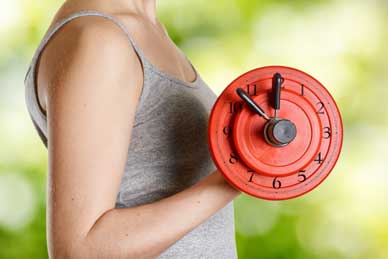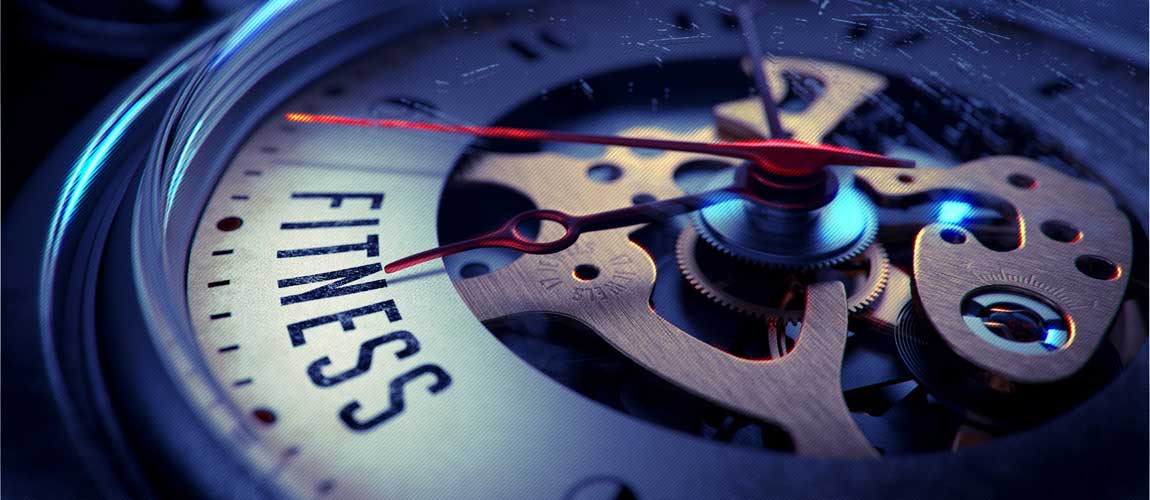Just being committed to a work out regime is satisfying. However, many still question whether circadian rhythms can influence results when deciding the best time to work out.
Whether working out to increase strength and endurance, or to improve our overall quality of health, many of us want to get the most out of our efforts and question when the best time to work out might be. This topic has been heavily researched with controversial results. The truth is, the answer varies depending on the specific question asked, your training goals and work out adherence.
Your Circadian Rhythm
All of the processes that occur within our body are regulated by precise cycles, also known as our internal clocks. Processes such as our heart rate, hormone secretion, body temperature, sleep cycle and energy levels all fluctuate in specific 24-hour rhythms.
All of these various internal clocks are based on signals from our environment. The internal clock that controls the circadian rhythm allows for this rhythmic cycle to be set and reset based on external stimuli such as light and darkness, food intake etc. These clocks send signals to all of our cells, which directs them on how and when to conduct certain physiological processes within our bodies.
Core Body Temperature and Power Output
Believing that the best time to work out may be affected by our body temperatures, researchers conducted a study that determined our core body temperature is lower in the morning and higher in the evening. The performance of study participants while working out was studied both in the morning and evening. Some would expect to see signs of fatigue in the participants during the evening work out, but the results were the opposite. The performance of all study participants was actually higher in the evening hours. Based on this study, it is also believed that strength output can be improved by up to five percent during these hours.
Hormones and an Anabolic State
The fluctuation of testosterone and cortisol levels within our body are one of the most important factors influenced by our circadian rhythm, giving us an indication as to when our body is in an anabolic state (building up muscle). It has been reported that testosterone production is low during the day and higher at night. The secretion of cortisol, which is a stress hormone that can put the body in a catabolic state (breaking muscle down), rises rapidly upon waking and decreases throughout the day, with levels low at night.
Using this information produces a ratio of testosterone to cortisol that indicates which state our body is in. With this ratio being highest in the afternoon and evening, it can be assumed that the body is in a state that is conducive to building muscle, therefore, this may be the best time to work out. However, more research is needed to determine if, and just how, this hormonal fluctuation is related to muscle growth.
The Best Time to Work Out
 From the information gathered about the circadian rhythm of our core body temperatures and hormonal fluctuations, the best time to work out seems to be between 2:30 p.m. and 8:30 p.m. This time frame is considered valid only for those that are awake when its light and sleep when its dark outside.
From the information gathered about the circadian rhythm of our core body temperatures and hormonal fluctuations, the best time to work out seems to be between 2:30 p.m. and 8:30 p.m. This time frame is considered valid only for those that are awake when its light and sleep when its dark outside.
Some of the most recent research findings suggest you may also want to consider the following factors when working out:
- Late afternoon is the optimal time for exercise as our core body temperatures are highest.
- It is reported that power output is five percent higher near mid-day and anaerobic exercise, such as running, improves by five percent during the late afternoon hours.
- Our endurance to exercise is reportedly four percent higher in the afternoon.
- We are less likely to suffer injuries in the afternoon, as our core body temperature is higher and our muscles are soft, flexible, and at the greatest strength.
- Although it may appear that afternoon exercise is the most optimal, research has shown that those who exercise in the morning are more likely to stick to their exercise regime than those that work out in the later hours.
Currently, there is no particular study that offers conclusive evidence that working out in the afternoon or early evening is best. What we have learned from these studies is that we may be afforded certain advantages during specific times of the day depending upon our goals, type of exercise and schedule.
Those of you who work out in the morning shouldn’t be discouraged. If morning hours are best for you, then stick to your current regimen. One of the external stimuli that the circadian rhythm responds to is exercise. It has been found that regular, scheduled exercise has the ability to reset the rhythmic cycles by causing a significant shift in the gene expression of the internal clocks. This alters the molecular processes within peripheral tissues, including muscles. Therefore, your circadian rhythm will learn to adapt accordingly to your regular morning work outs.

